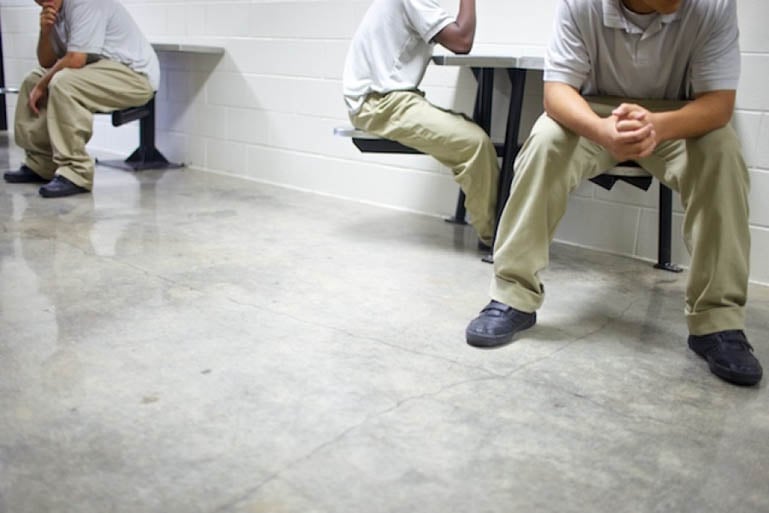
The Conservative Case Against Locking Up Minors
Above: Youth in the Texas Juvenile Justice Department's Phoenix Program, photographed in September 2012.
Until recently, the conservative pivot from “tough on crime” to “right on crime”—policies that push de-incarceration for nonviolent offenders—has been couched in economic terms. Locking people up is expensive. If it doesn’t increase public safety, why do it? But a new criminal justice study from a prominent right-wing think tank barely even mentions money. Instead, other Republican love objects take the fore: family and responsibility.
The subject is confinement of youth for status offenses. A status offense is a behavior outlawed for minors that would be allowed if an adult were doing it, like drinking, violating curfew or, most vaguely, “incorrigibility.” Federal law prohibits extended detention of children for status offenses, but the Texas Public Policy Foundation (TPPF) estimates that thousands of minors are still hauled off to jails because of a legal loophole: violating a valid court order. It’s basically contempt of court for kids. If you run away from home, and a judge tells you not to do it again, but you do, then you’ve violated a valid court order and can be sent to a group home, detention center, or other residential facility. The practice has dropped in popularity nationwide, and Texas accounts for more than 15 percent of confinements for status offenses nationally—about 1,300 a year.
The study’s authors call these detentions unnecessary government intrusion. “When I was a kid, half of this stuff seemed to be juvenile shenanigans,” says Derek Cohen, a policy analyst for the TPPF’s Center for Effective Justice. “[It’s] the sanctity of the family, and I would say the responsibility of the family to discipline their own children without the state interceding.”
Punishment for status offenses are distinct from criminal punishments because they’re meant to protect youth from themselves rather than to protect society. Putting kids who’ve only, say, run away from home in close quarters with serious juvenile criminals risks fostering antisocial attitudes and gang affiliation, the report says. “In addition, the confinement of status offenders is expected to increase barriers to reentry into community, home, and school settings, and increase the likelihood that they will be rearrested, re-adjudicated, and re-incarcerated,” write the study’s authors.
It’s an interesting tack for the think tank that recently posted a piece on its website titled, “Forcing Reusable Bags On People Really Is Dangerous.” Research indeed shows that criminalizing youth misbehavior such as truancy (which in Texas, unlike most states, can be a misdemeanor) does more harm than good. But the same research demonstrates that other barriers to re-integration, like the many restrictions on felons, increase the risk of continued criminal behavior. The Texas Public Policy Foundation folks see some of this as government overreach, like the occupational licensing requirements that bar felons from obtaining certain jobs.
But they do have a limit. Will the state’s foremost conservative think tank someday advocate for ex-cons to be eligible for food stamps? “We haven’t considered that,” Cohen says. “That’s not really in our bailiwick.”
To support journalism like this, donate to the Texas Observer.

